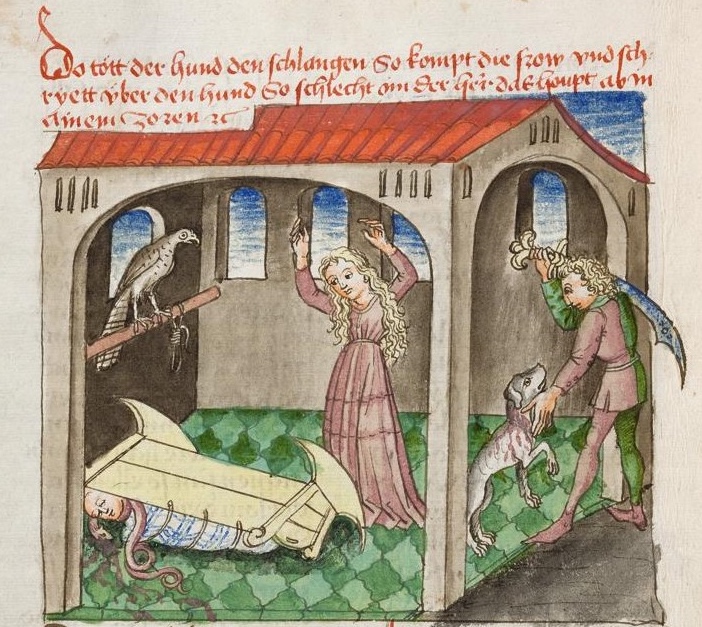Verrassingen
The martyrdom of a dog

Are modern people crazy about their dogs? No comparison with the Middle Ages! Look at this greyhound, called Guinefort. He was killed by his own master – and became a saint.
We learn about his life in Stephen of Bourbon’s († 1261) exempla, which is a report of the Dominican inquisition in the diocese of Lyon. Stephen narrates that near Neuville there had formerly been the castle of the Lord of Villars. One day, when the lord and his wife had left their baby alone in the castle with their greyhound, a huge serpent broke into the manor. The dog attacked it. After a long fight, during which the baby’s cradle tipped over and the whole floor was stained with blood, the greyhound prevailed. On her return, the lady saw the overturned cradle and the blood. She thought that the dog had killed the baby. The lord immediately slew the greyhound. Soon they found the sound baby and the dead serpent. Deeply regretting, they gave the dog an honouring burial. Generations later the peasants who had heard about the unjust death of the dog, visited the grave and venerated the dog as ‘Saint Guinefort’. The inquisition destroyed the grave and banned the cult. Did people in thirteenth-century France really venerate a dog? And did pythons live in medieval Lyon? The story of the unjustly killed animal is already told in the Old Indian Pancatantra, and retold several times, for example in the 12th-century Roman des sept sages, which was adapted in Latin, Italian, and German. At some stage literary tradition turned the dog into a saint, possibly mixing it up with the dog Guinalot, the half-brother of Carados in the Premier Continuation Perceval (ll . 6201–04), and with the human martyr Saint Guinefort. Literature makes everything possible.
Cora Dietl
Further reading
Schmitt, Jean-Claude. The Holy Greyhound. Guinefort, healer of children since the thirteenth century. trans. by Martin Thom. Cambridge: CUP 1983.
Image
Sieben weise Meister (Prose version b), included in Gesta Romanorum. Karlsruhe, Badische Landesbibliothek, Cod. Donaueschingen 145, fol. 16v. (Creative Commons)

